Meeting Street Overpass and Ramps
July 20, 2005: Meeting Street Before

August 8, 2005: It started today
Each 2nd Monday, Jack Alterman offers a public presentation of some aspect
of photography. From the Post and Courier, I learned that tonight's program
was with David Russin who discussed "self assignment, creating photographic art". Since I "self assigned" myself tracking the construction of
the Ravenel Bridge and have just reassigned myself to tracking the unbuilding
(demolition) of the Grace and Cooper Bridges, it seemed like the perfect
opportunity to learn more about my weekend project.
After the session, I suddenly noted that a segment of the Pearman on ramp was
absent. With night racing toward me there was little light for capturing
the first demolition event. Here are the first photos of sleeping bridge
eaters:
My first look - with billboard, sleeping bridge eaters and bridge fragments

From Saturday's survey - note the number "9" on the column above and
compare with Saturday's photo below (from a different angle)

Just fun displays of what was and now what is not


Here you can clearly see rebar fragments protruding from the prestressed
girders

August 9, 2005: Unbuilding a bridge - one bite at a time - about 7am
There was just a moment of morning sun before the thundershower - but enough
time to catch the first moments of work this morning. These huge
bridge eaters (for lack of a better word) have rather large jaws and
take small bites of the beams as shown here. The bridge floor is constructed
of box girders as can be seen as long boxes.
It turns out that what I called
a bridge eater are technically mobile shears manufactured by
Stanley LaBounty in
Two Harbors, MN. As a sneak preview, Stanley LaBounty has provided
a 38,000 pound grapple to remove steel portions of the bridge from the
river - which we shall see in action over the next couple of months.
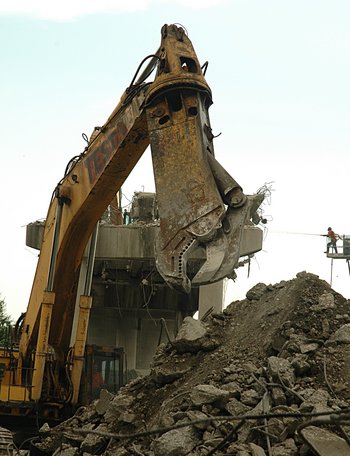
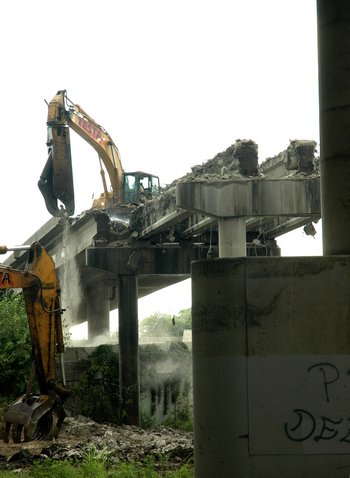
Simultaneously the waterman on the right is flooding the bridge with water
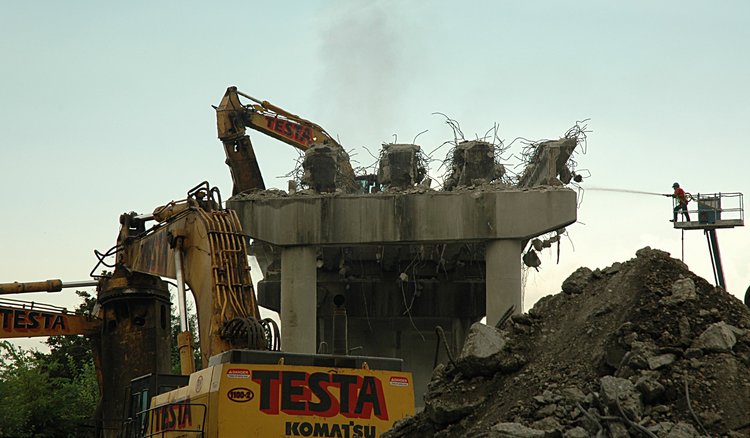
And the work goes on - one bite at a time
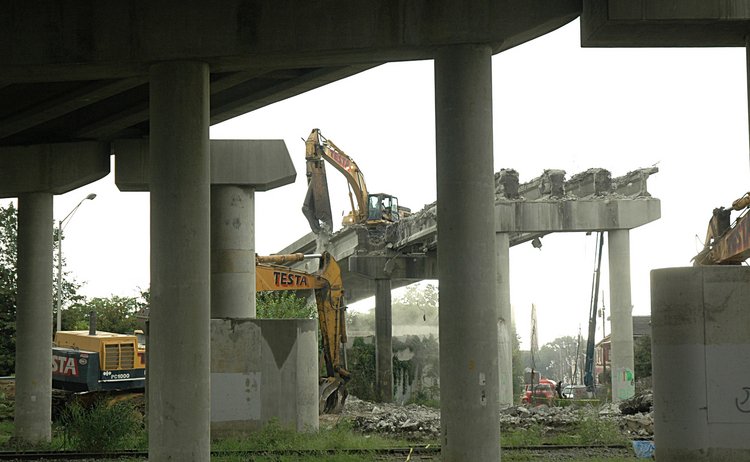
Back around 5pm - what a difference 10 hours makes;
Taking a bite over Meeting Street
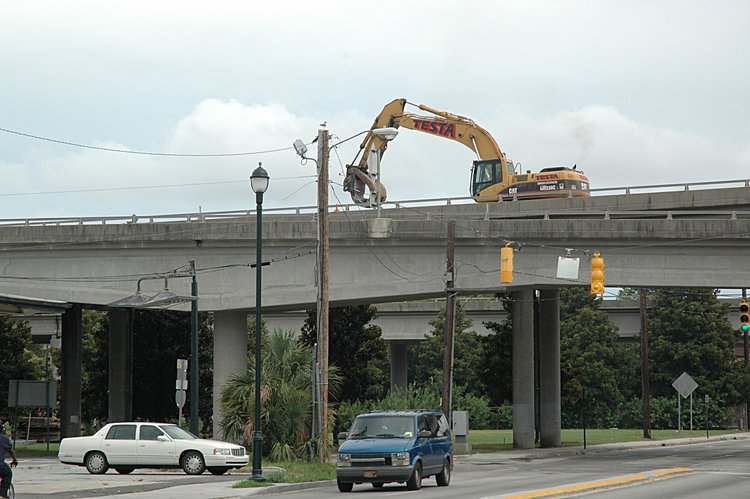
This used to be the beginning of the Pearman on ramp
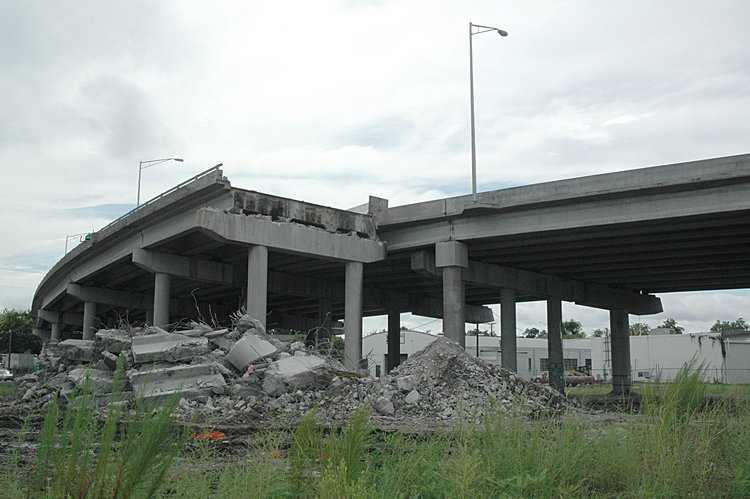
Well, this is what was the Pearman approach
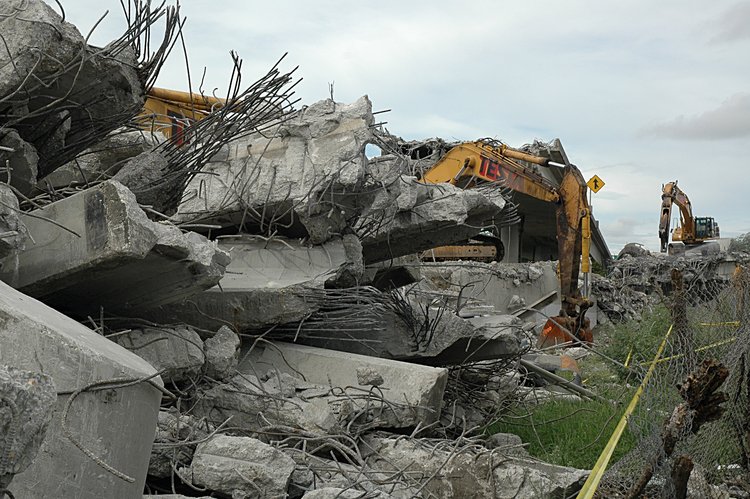
Straight out of Star Wars - the fight among mobile shearers

August 10, 2005: 6:30am
Work with Cashman-Testa starts early, continuing demolition and
clearing the rubble from removal of a segment of the Pearman on-ramp

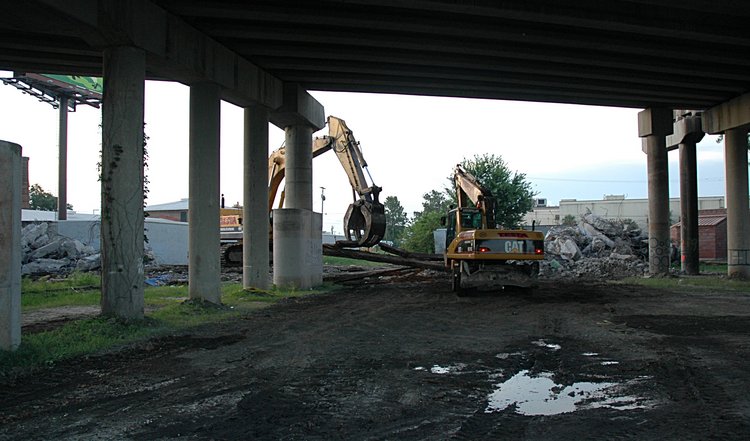
Also refining the plans for today and this weekend.
For today, work will start
to remove the Grace off-ramp between King and Meeting Streets - with
each individual column marked for removal or to stay.
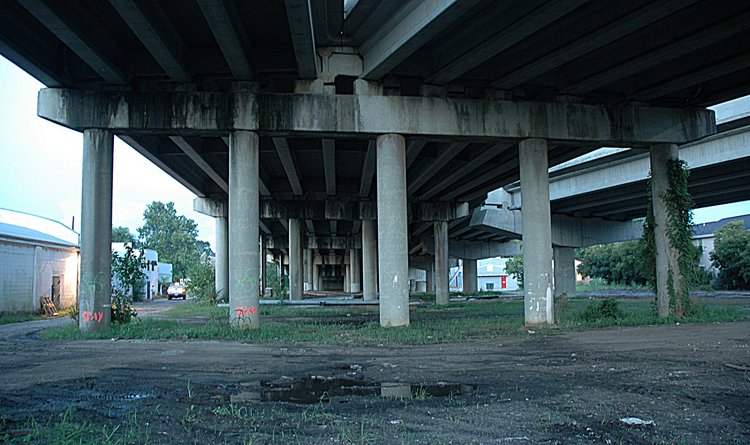
Ken Canty is the project engineer and my demolition professor.
Here Ken is explaining to me the
numbering and labeling of each column. All these labels are necessary to
preserve the demolition sequence. Here, this column (7, with zero as the
first column vs the x'ed out 8, where one was used to indicate the
first column) is scheduled
for removal (green Demo painted section)
(The blurring of Ken is a photo problem - since Cashman-Testa are early
risers, there is little light available, and in this case, the 6:30 am light
required a long exposure).
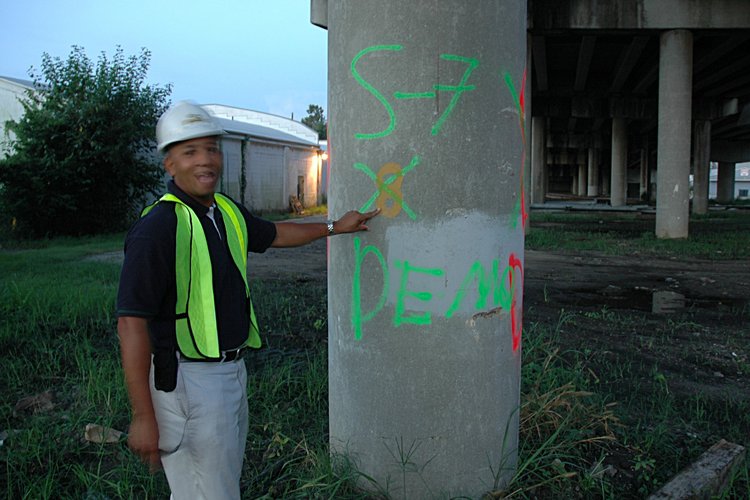
For this weekend, the Grace ramp that passes over the King Street
off-ramp and the crosstown I-26 on-ramp will be removed.
Friday
the I-26 King Street off-ramp (Exit 221B) will be closed from 7:00 pm
until 6:00 am Sunday August 14th so that the Pearman
overpass can be removed. Following the re-opening of the
Meeting street off-ramp on Sunday morning, the westbound I 26 on-ramp
and the US 17 Northbound lanes will be closed at Coming Street.
In addition, the the pavement for Exit 221B off-ramp will be removed,
roadbed graded and lowered about
a foot in order to increase the clearance between the King Street ramp
and the I-26 overpass. Lots of action this weekend.

August 10, 2005 6pm
Look! - The Grace off-ramp passing over I-26 Exit 221b near
Meeting Street is partially gone.
Compare with the morning (6:30 am) photo.

(6:30 am photo)

The Pearman overpass on-ramp gap after removal yesterday

Looking west from the Grace off-ramp

Lookng east from the Grace off-ramp

And for all the ocean lovers - "Jaws" in action - cleanup after removal
of a segment of the Pearman on-ramp (photo taken at 6:00 pm)

August 12, 2005: Unbuilding the I25-Exit 221b overpass
What an adventure - to watch the unbuilding of the overpass. Here is a
photo-description of removing an elevated section of highway. There
were two challenges: how to take meaningful night photos and the
understand the girder removal process. For the first, I must thank
Stephen SetteDucati for some
quick lessons in night photography.
The engineering challenge is how to remove the overpass girders without
destroying the roadbed underneath. First the roadbed underneath the
overpass is covered with a blanket made of old automobile tires - to
absorb the shock associated with falling debris. In addition,
I learned from tonight's
adventure that there are two classes of machines are used: one with a hydraulic
shear for cutting the concrete girders (including the embedded rebar)
and the other, I believe is a hydraulic grapple for
holding and stabilizing a girder while it is being cut with the shears.
It also plays a role in picking up and transporting large chuncks of debris.
The overpass is supported by pairs of vertical columns (piers) with a
cap on top. The space between caps is spanned by some sort of girder -
steel or prestressed concrete. The roadbed is then built on top of
the girder structure. To remove the overpass, it seems that you just
reverse the process - roughly following this recipe:
- Remove the aluminum rails
- During the removal process, water is sprayed in the direction of
the work area to minimize dust.
- Remove the side barriers
- Push through the roadbed floor between the beams
- When all the roadbed between beams is removed, then one machine with
claws or grapple (I call it a whatever until one of you tells me the
proper name)
holds and stabilizes the beam close to one of the supporting caps. At the
same time another shearing machine (giant sissors) cuts the beam near the
edge of the pier - small bites, starting at the top and finally cutting the
last chunk (concrete with embedded rebar). The grapple machine then
slowly lowers one end of the beam until the rest sort of falls off the
other supporting cap.
- The operators of these machines then clean up the girder debris
and and move it to the side for later reprocessing. The rebar will be
separated from the concrete and pretty much everything recycled. Large
segments of concrete will be transported to the Navy Shipyard and placed
on barges and then deposited at artifical reef sites off our coast.
- When all beams are removed, the pair of near piers and cap are pushed over
with one machine cutting the base of one column while the claw machine
gently pushes the entire struture over.
Here is the overpass with side rails, supporting piers and caps -
a before view
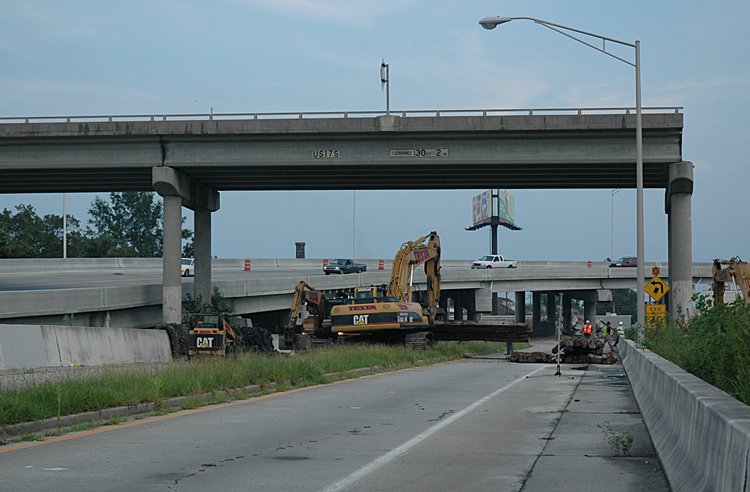
Removing a segement of the side aluminum rail
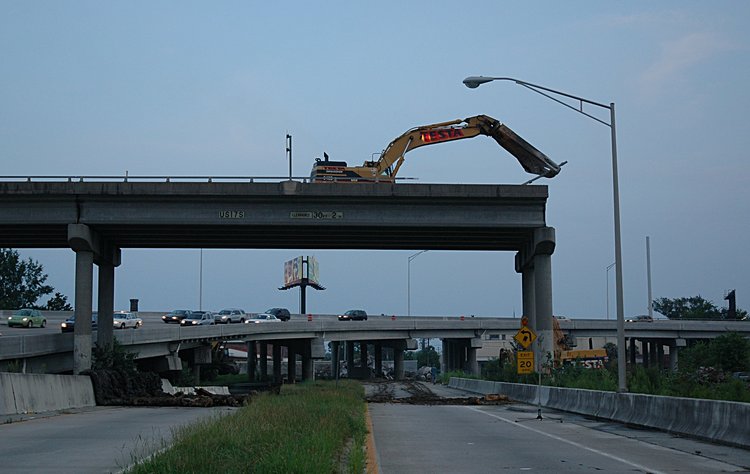
Cutting and pushing the edge barriers over the side - chunk by chunk
starting on the north side
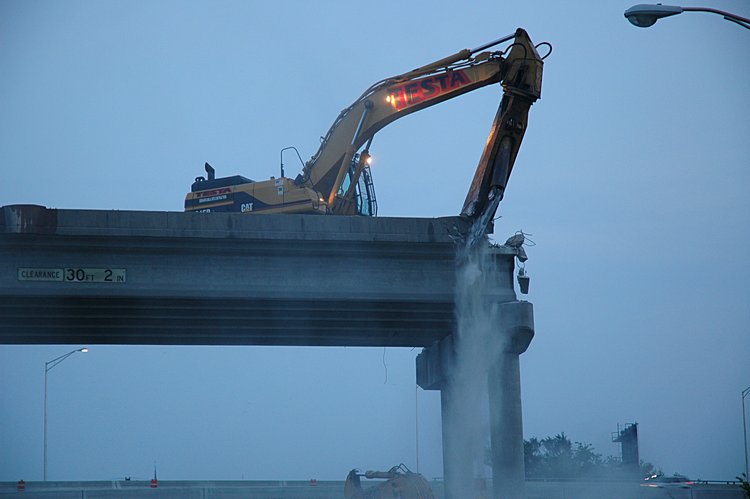
A larger chunk on the north side
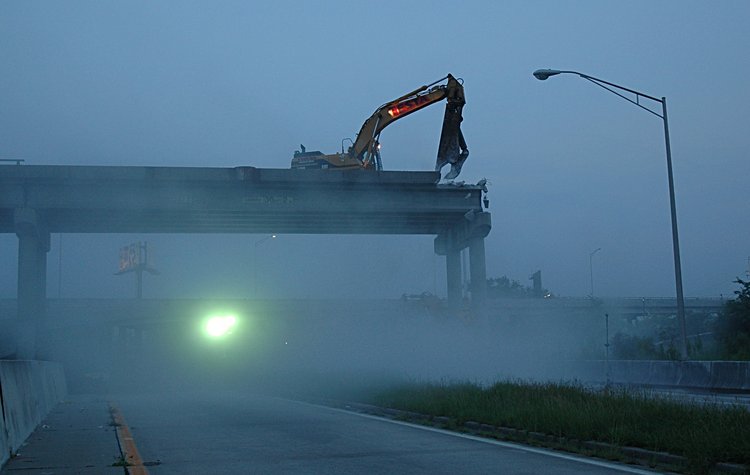
Then working on the south side - punching through the areas between girders
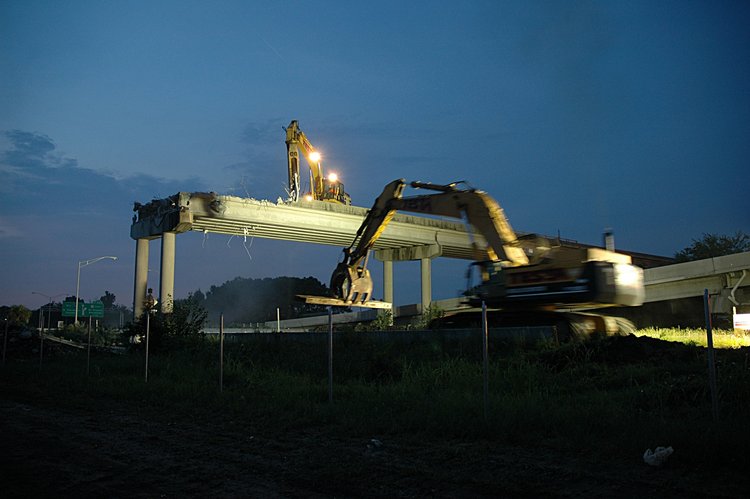
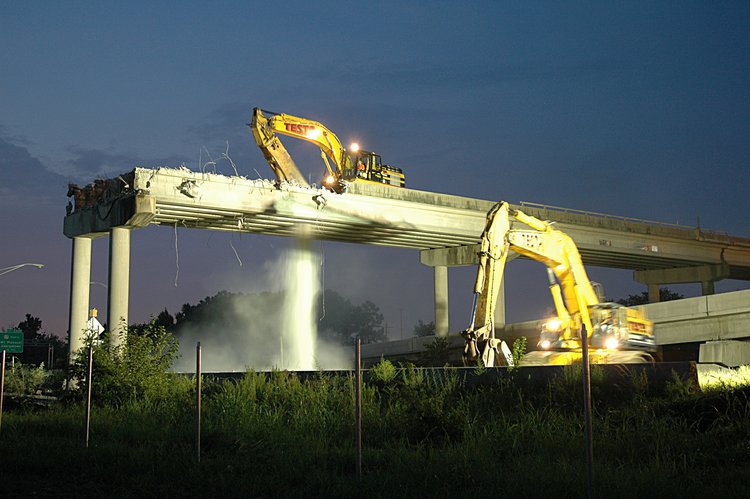
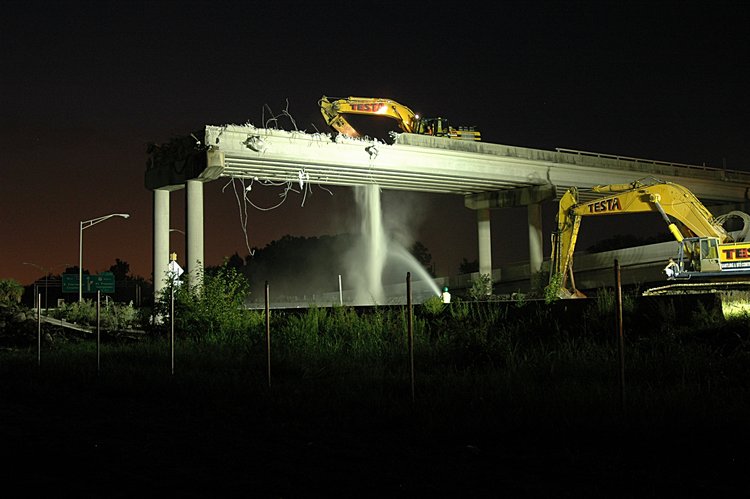
More punching through the floor between girders
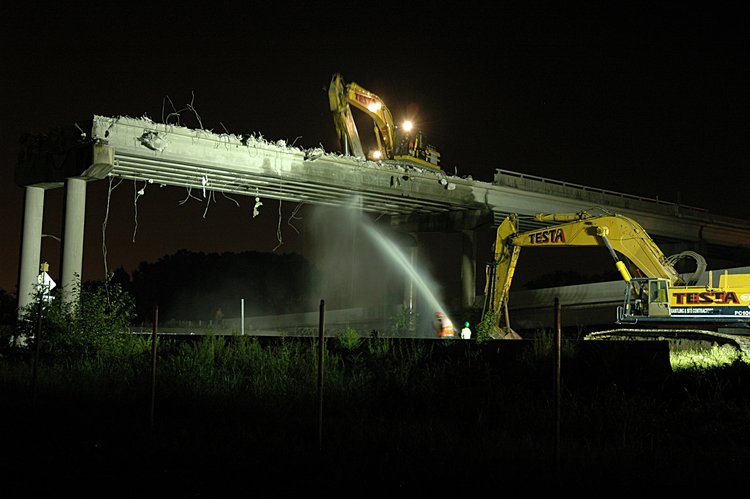
While holding the girder with a "whatever" the hydraulic shearer takes bites
out of the first edge girder at the edge of the cap - weakening the area
over the pier cap
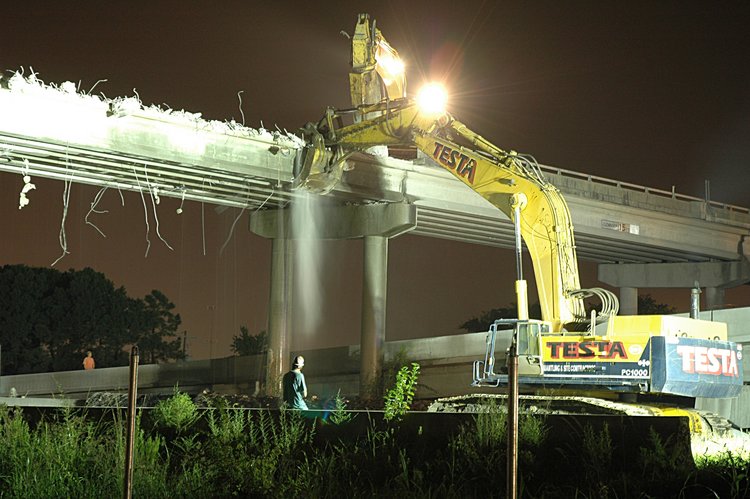
Shearing in action
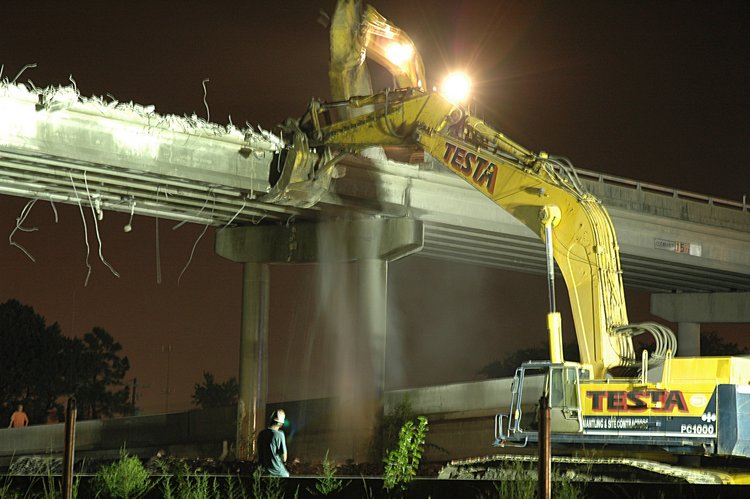
Then gently lowering the first girder

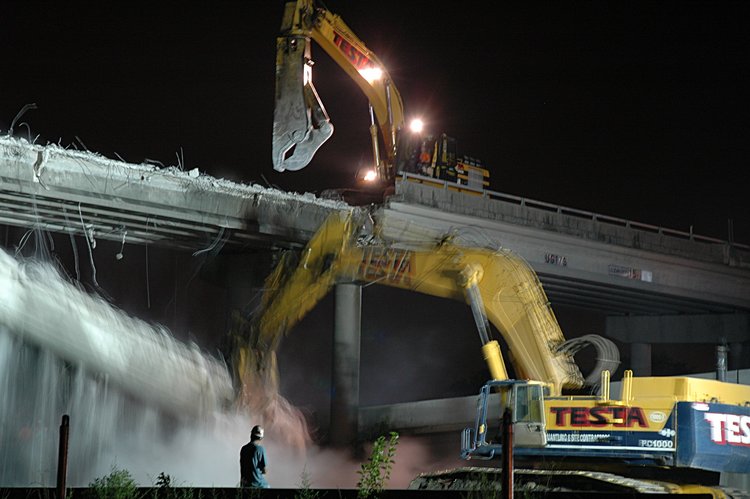
and a little cleanup action
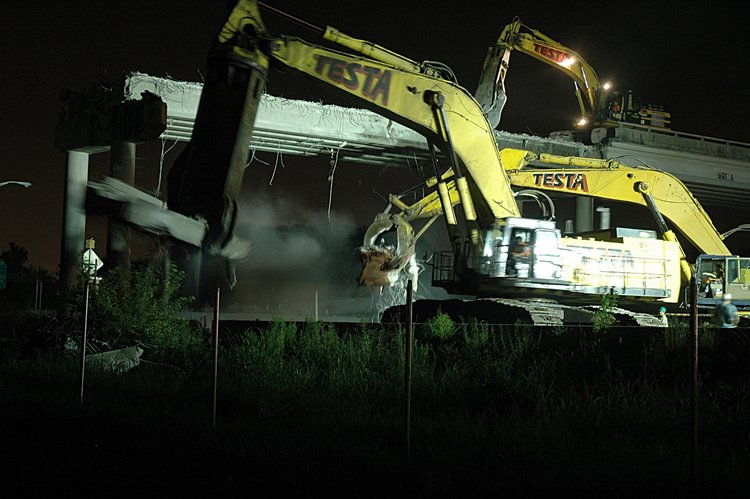
After some time (about 2 hours) removing the final girder:
continuing the hold and shear process
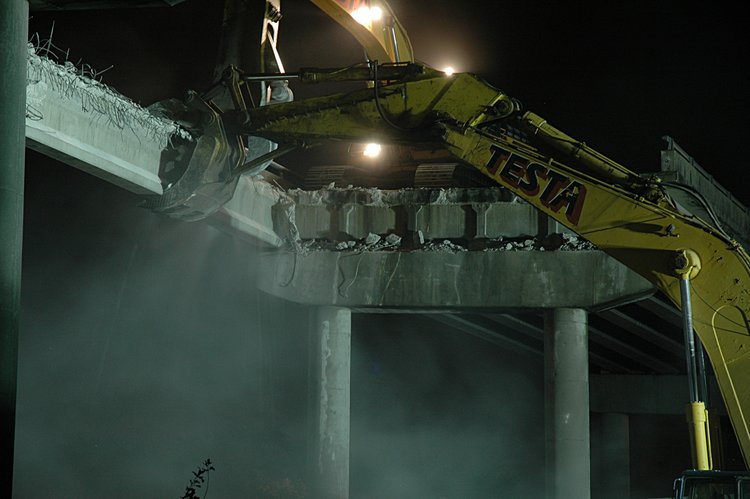
a deeper bite
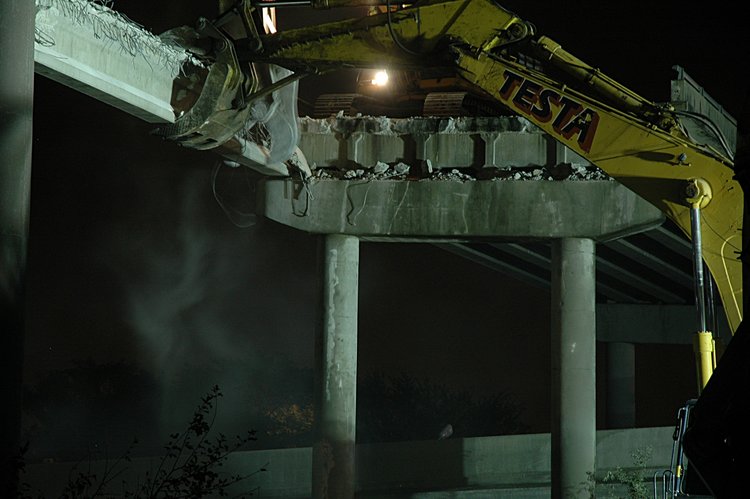
and the final bite
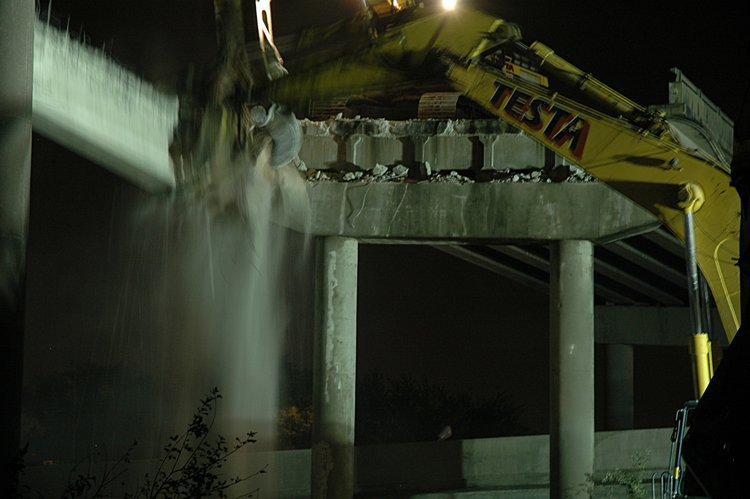
and gently lowering the girder
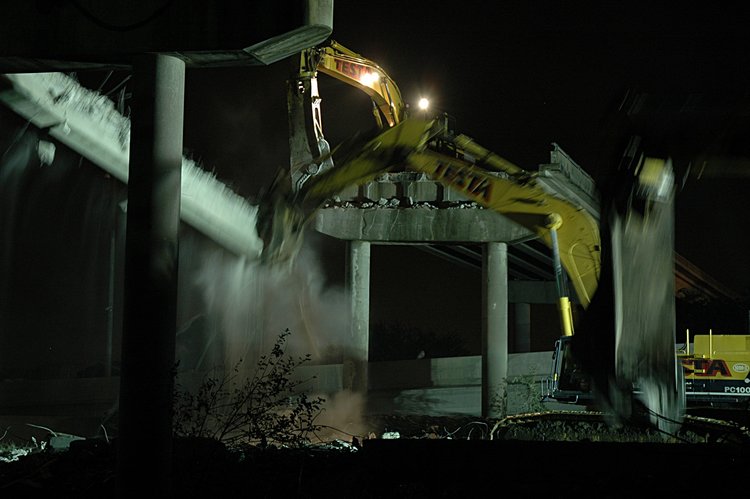
down
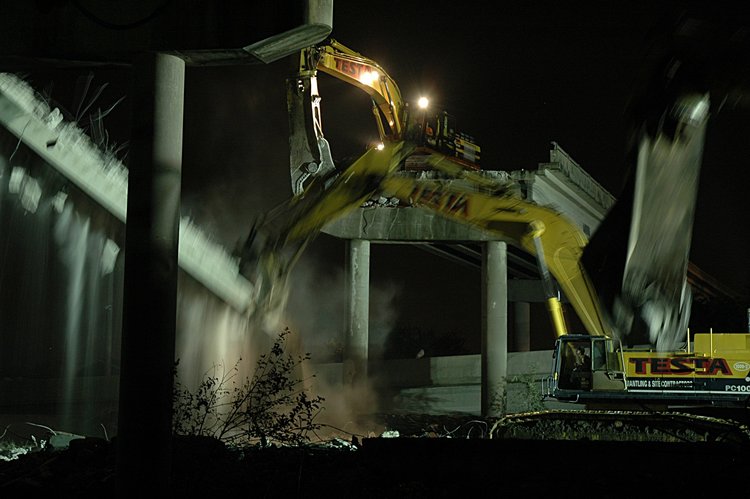
down
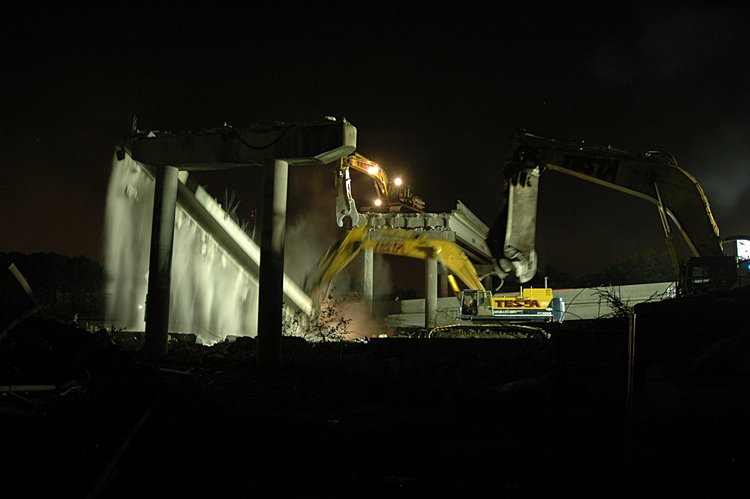
to a temporary resting place - where cleanup begins again
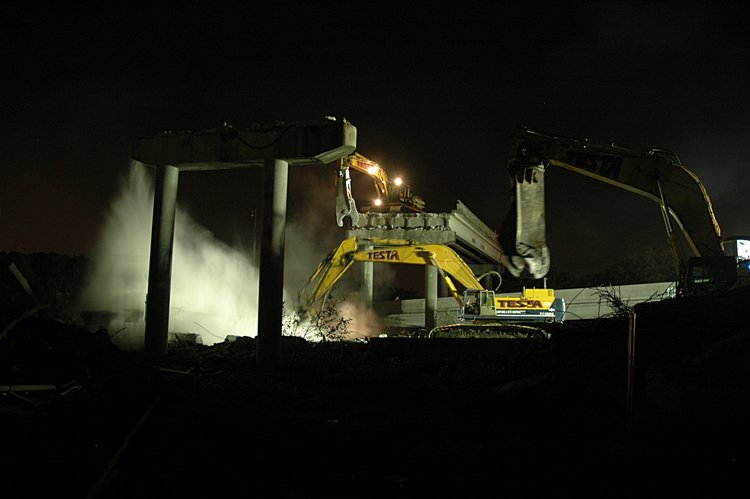
Now that all the girders have been removed, the last step is
gently pushing the pair of piers and the cap over
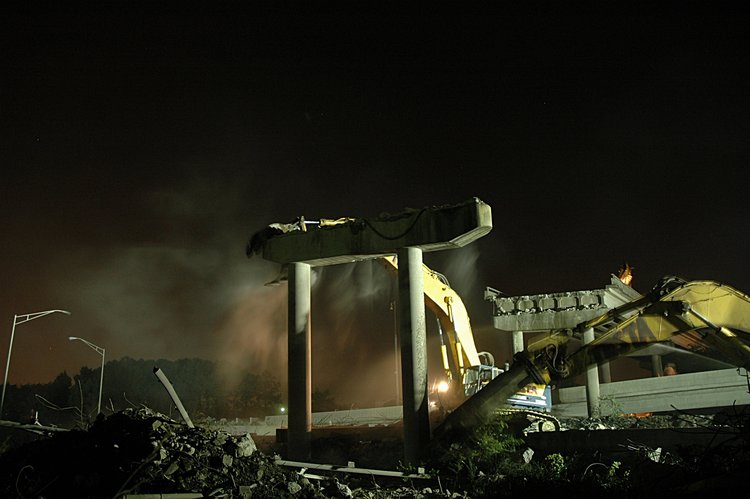
The left machine is biting the cap while the right machine is right
machine is biting the base of the right column.
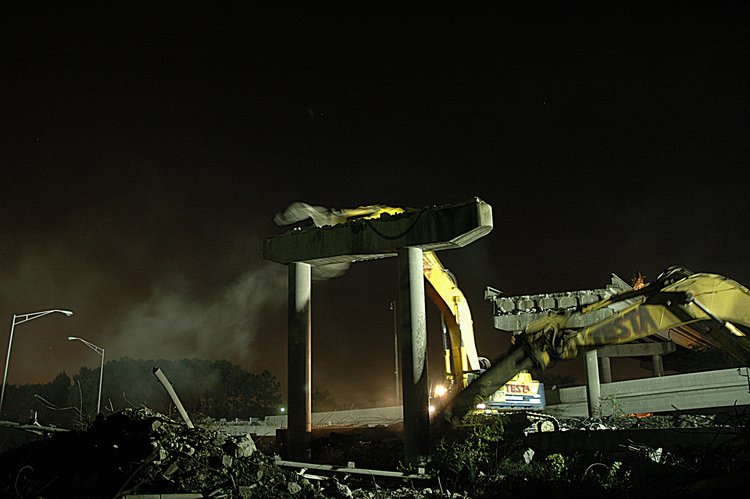
Jaws wide open after a gentle nudge
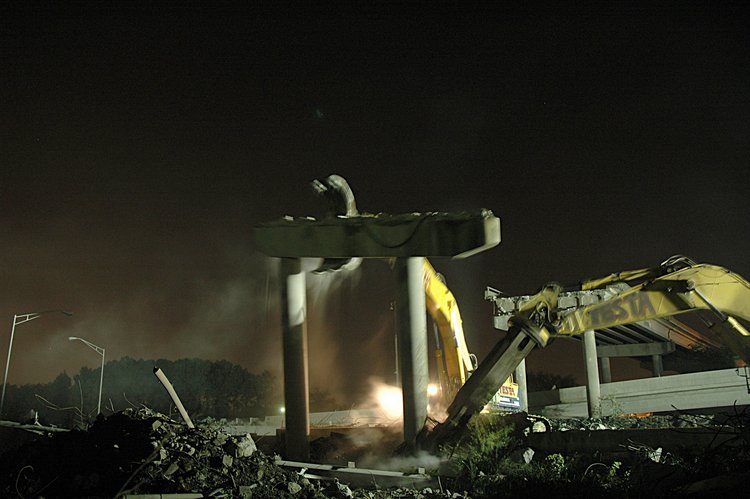
And then gravity does the rest of the work
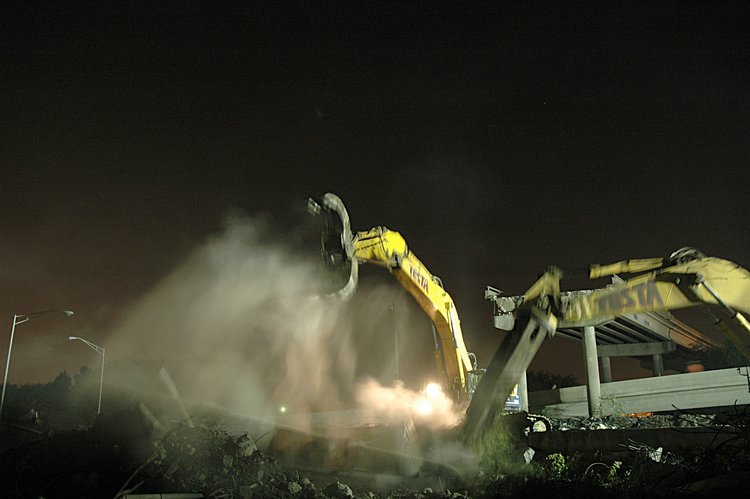
and cleanup
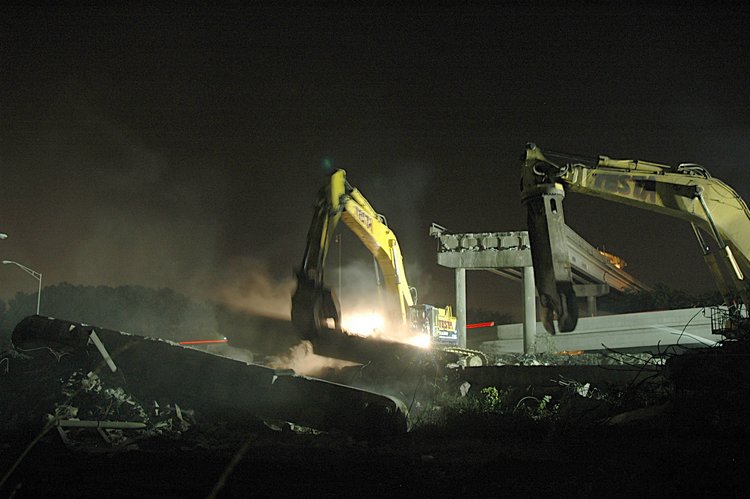
and more cleanup
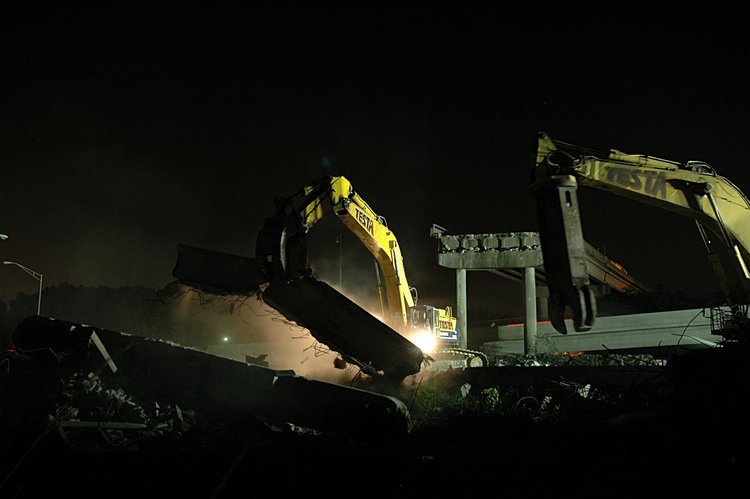
and I went home after admiring the clean interface between the next
set of girders (spanning the I-26 on-ramp) and the supporting cap.
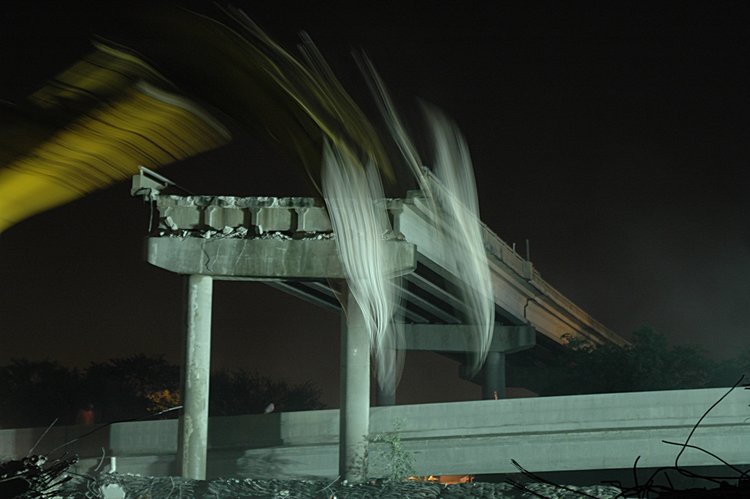
August 14, 2005: Lifting girders from the I-26 overpass
The Testa-Cashman guys were at it all night - and when I arrived about 6am
the removal of the floor girders on the piers east of the I26 overpass
was almost
complete. Here is the story of overpass girder removal:
lifting compared with
the Friday night removal by gentle lowering of the girders.
The procedure consisted of attaching cables to each girder, cutting the bolts
that coupled the girder to the caps, lifting the girder, rotating it and then
lowering it. I have tried to capture most of the steps in the procedure.
I shall fill in the details a bit later
Continuation of removing the girders on the east side of the overpass

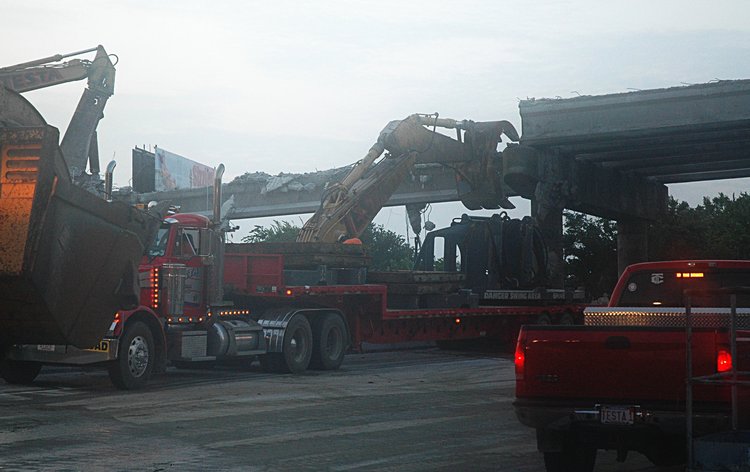
After all the east girder were removed - here is the I-26 overpass.
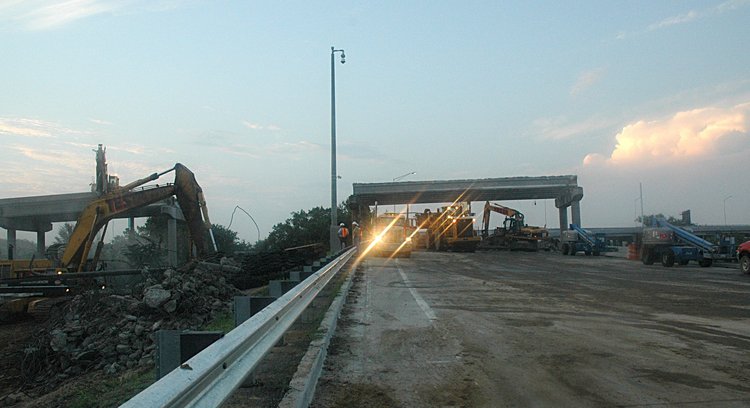
First - clean up the debris from removing the roadway between the overpass
girders
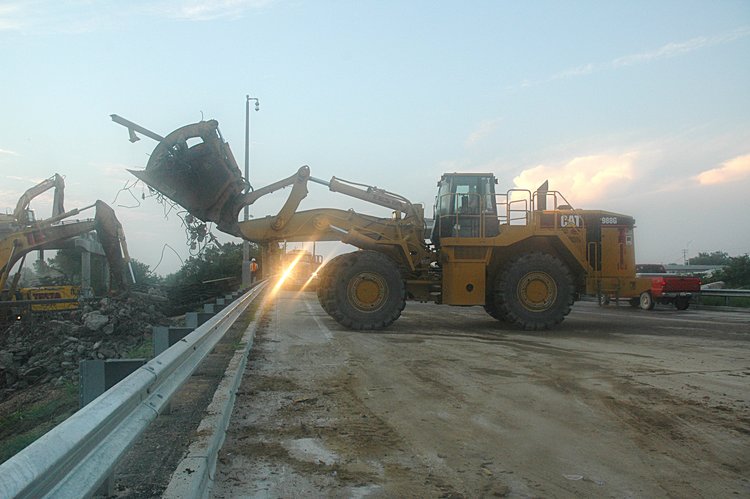
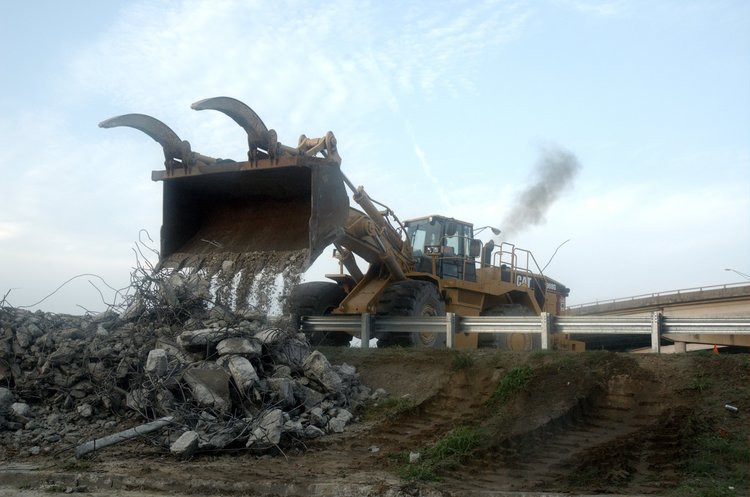
Erecting the crane that will be used to life the girders
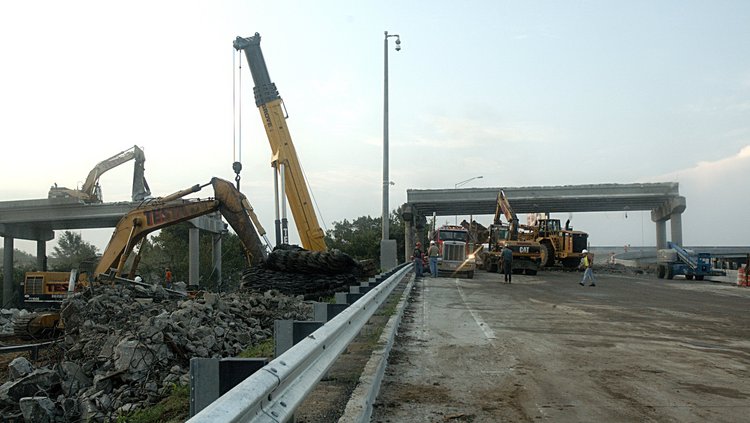
Moving the lifting cables into position between the edge girder and the
one next to it

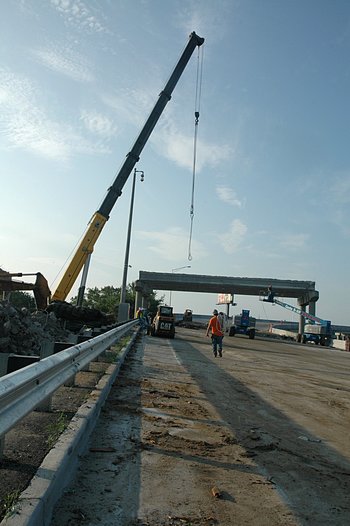
Lowering the cables between the girders

Looping the cables around the outside girder
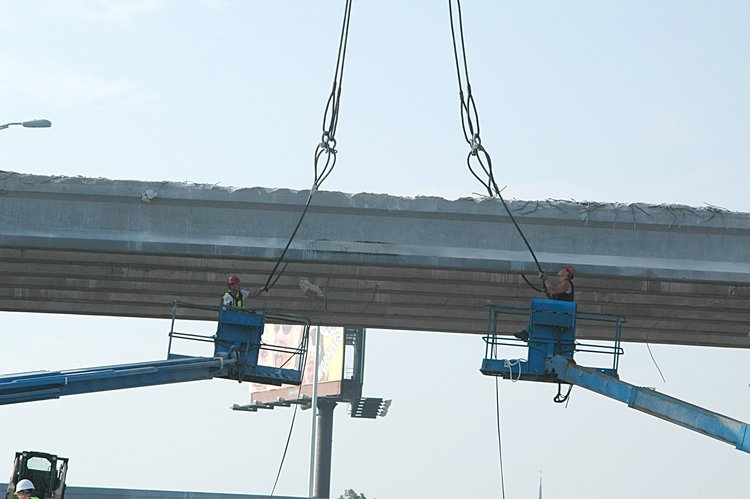
Moving the loops into position
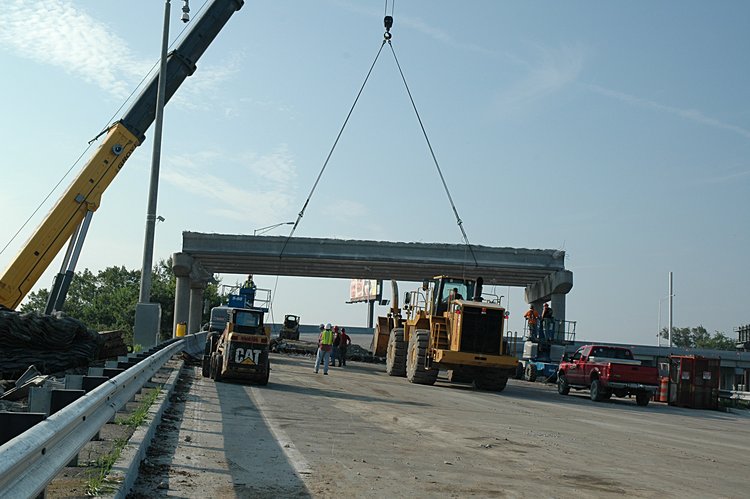
Initial lifting of the girder
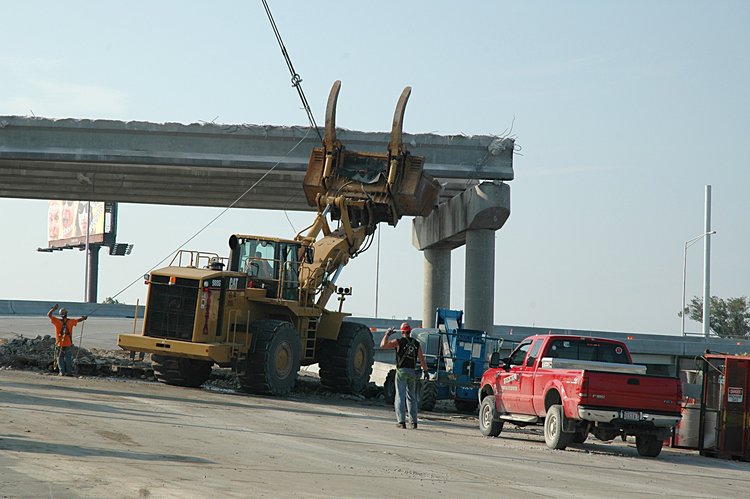
the lifting the entire girder
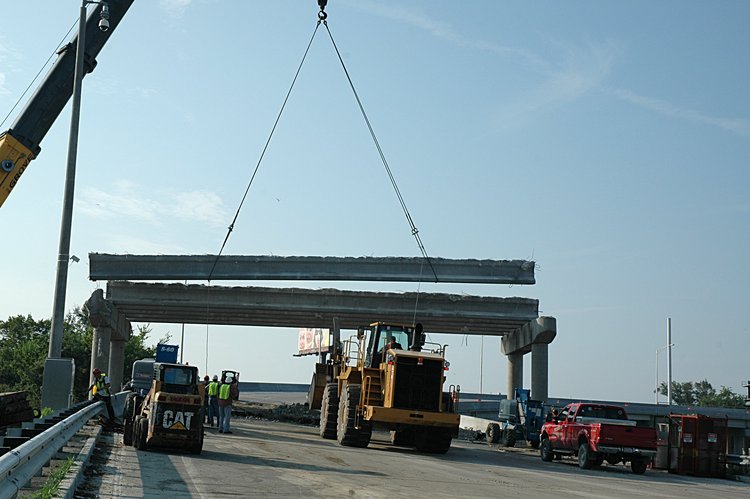
rotating the girder and lowering it to the ground
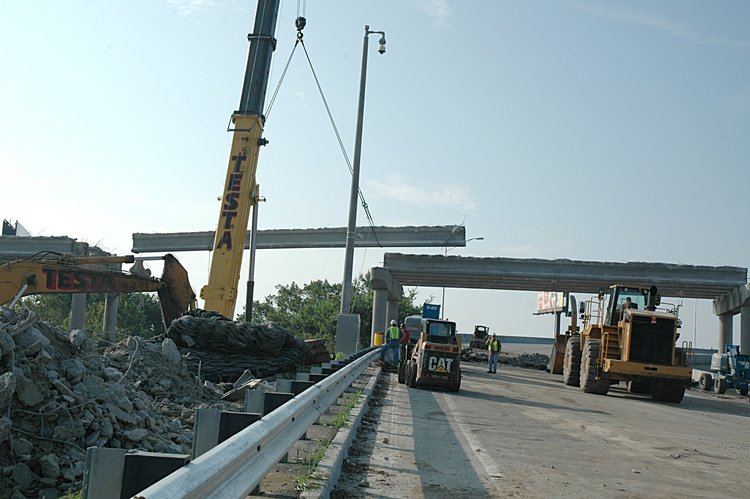
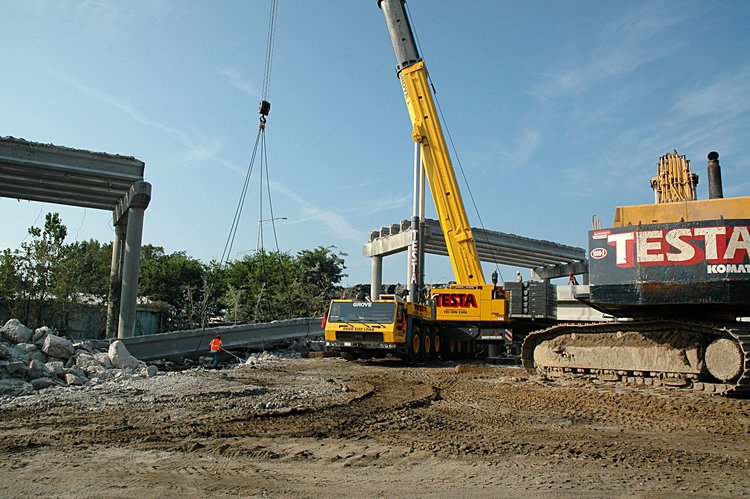
Decoupling the cable loops
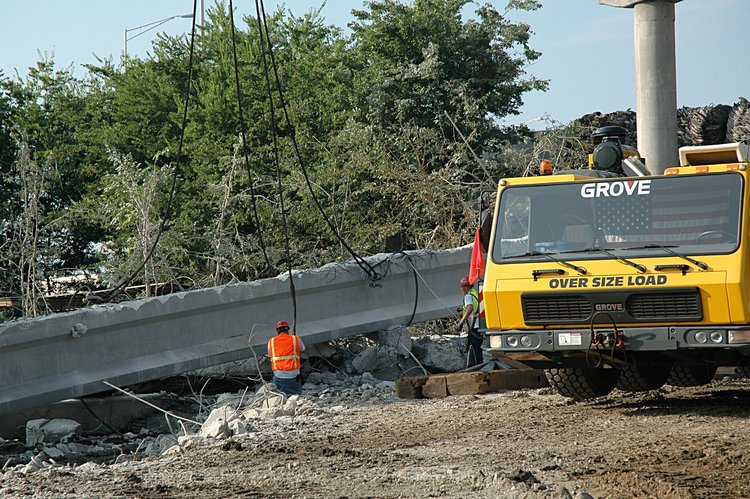
Rotating the lift cables back to the next girder
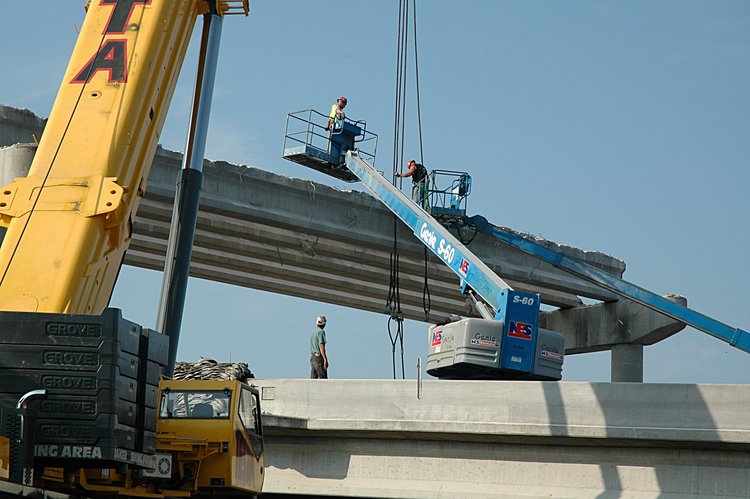
Positioning the left cables
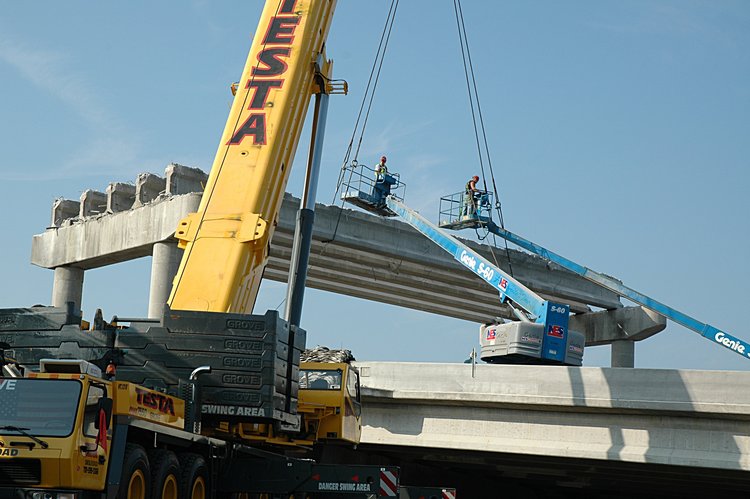
Cutting the attachment between the girder and the pier cap
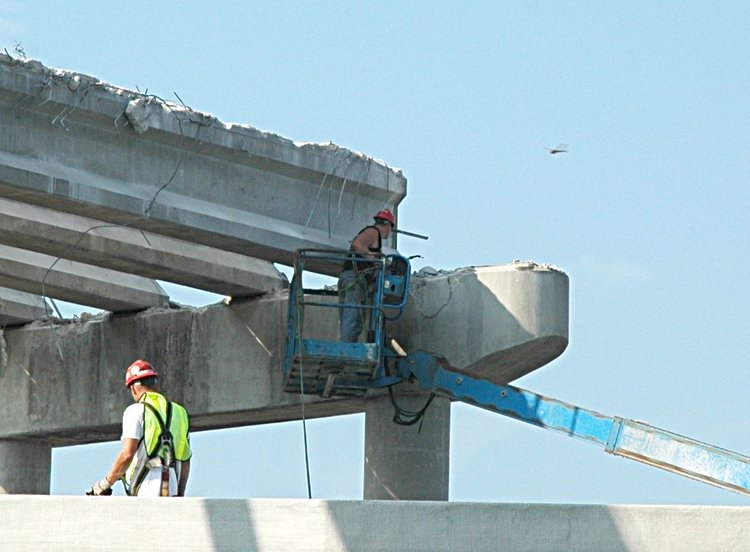
An initial lift from below
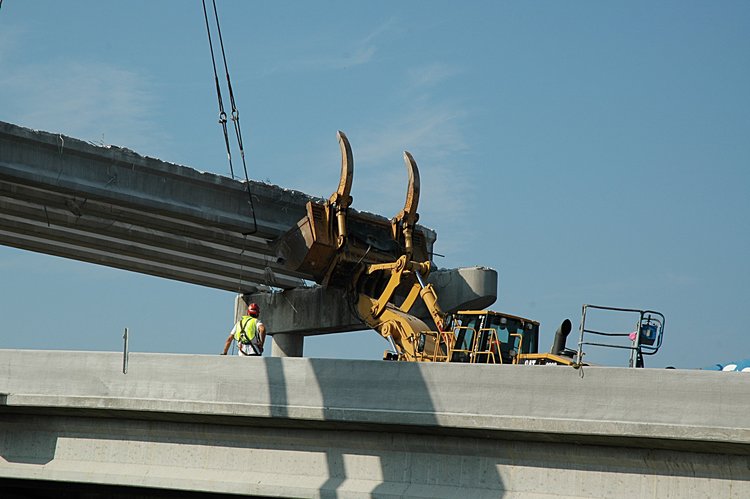
Then lift - slowly slowly

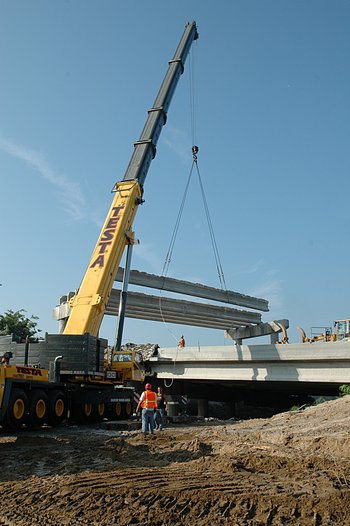
Rotate and lower

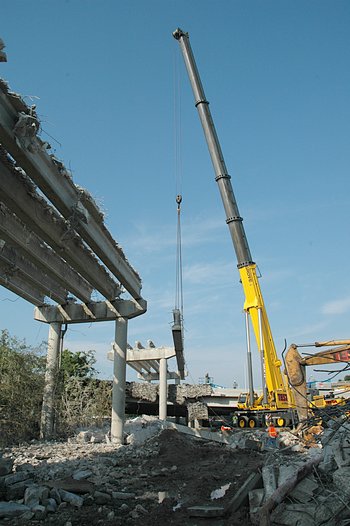
Note the protective blankets placed over the I-26 edge barriers

to the final resting place
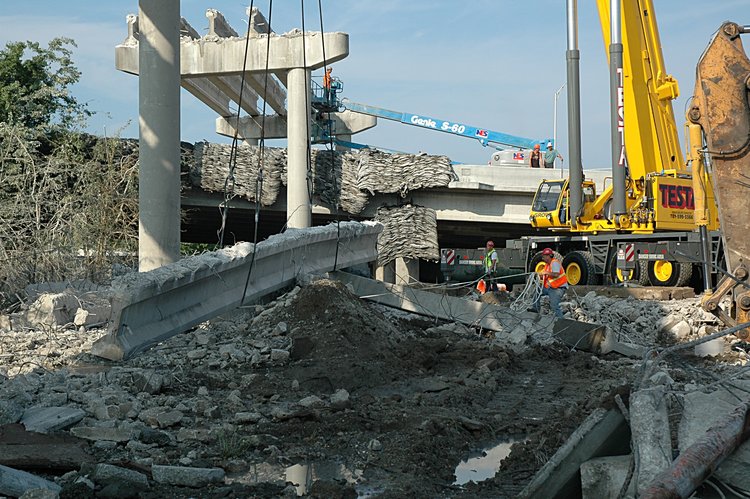
Decouple the cable loops

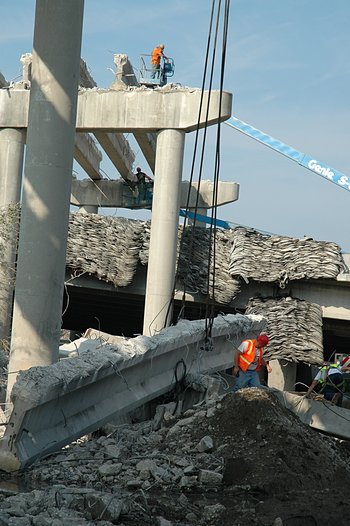
And so it start again with lowering the cables between the next
pair of girders
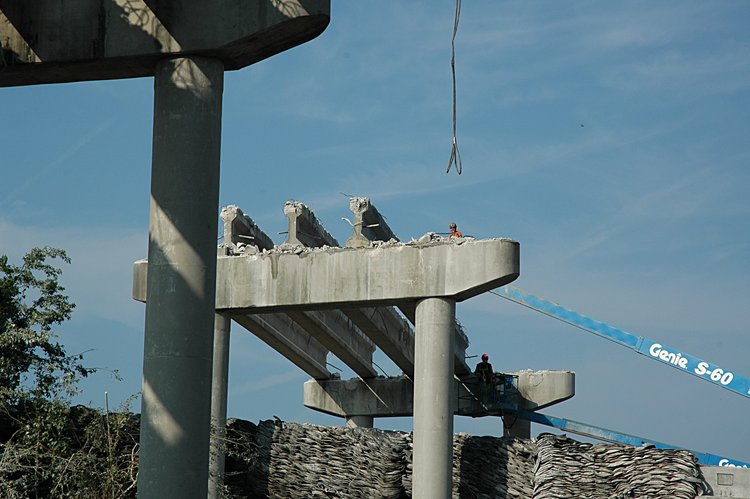
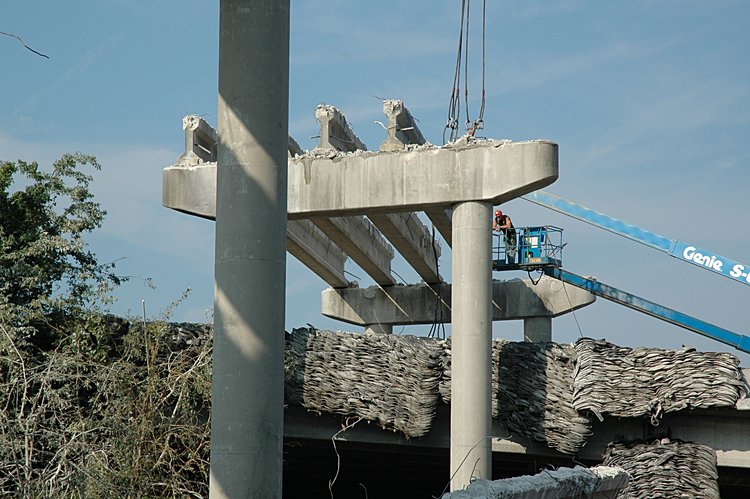
Making the loops
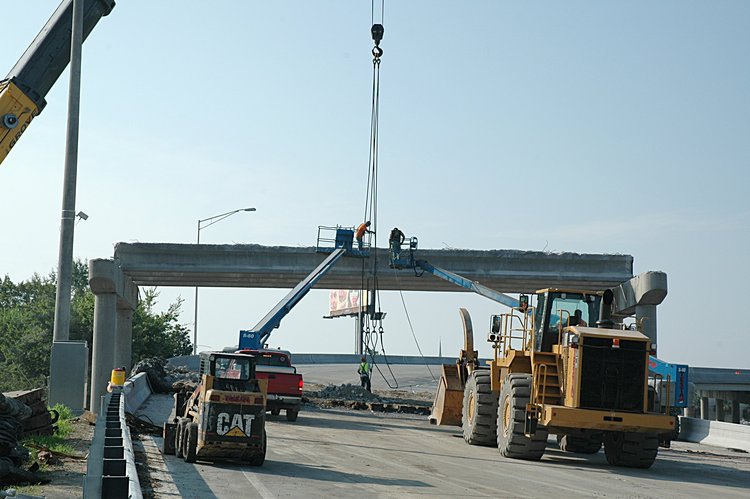
Raising the loops and moving them into the lift configuration
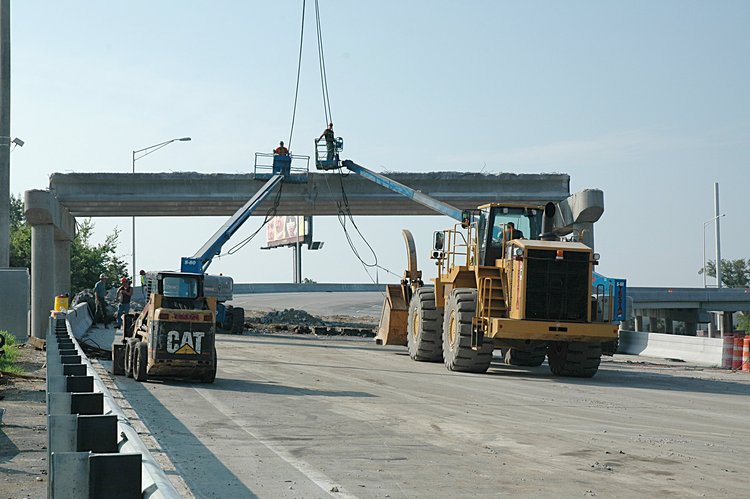
and so the process starts again
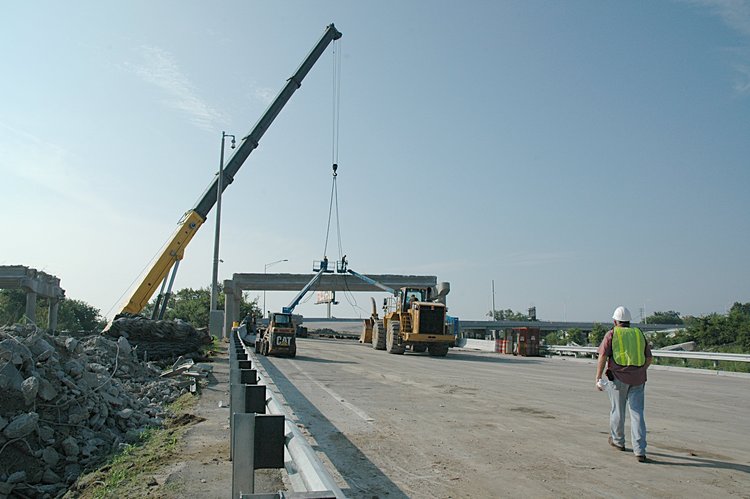
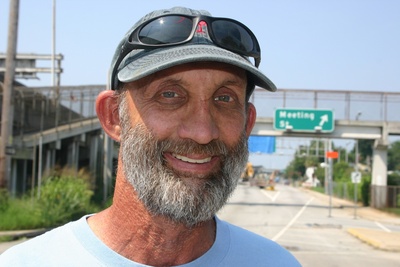 August 15, 2005:
August 15, 2005: Removing the Meeting Street Overpass
Sparky Witte has joined our team and here he is tracking the Meeting Street
Overpass demolition. Gary Eaton took this photo and we met during the
Ravenel Bridge construction. Gary caught Sparky - and here is the result.
I like it!
Here is an initial view of the Meeting St. overpass (left) and
a shear at work with a jet of water to reduce the dust (right).
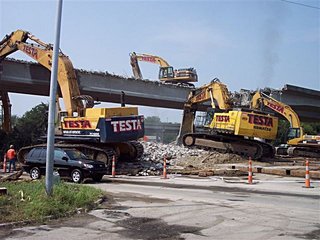

A good view of the shear, eating away at the edge girder (left) and
more shearing and water action (right)
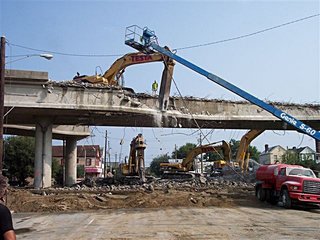

Here a grappble grabs the residual girder. Note the rubber tire blanket
in the left foreground to protect the Meeting St. roadway (left) and
continued shearing and using the grapple to stabilize (my speculation)
the residual girder - and of course, more water for dust management (right)
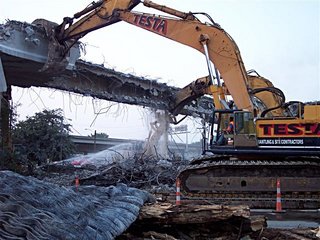

Now its about 8:30 pm, more shearing of the overpass girders
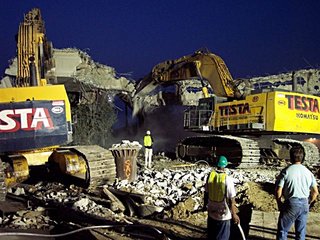

Gone is the central section of the Meeting St. overpass and continued
biting off segments of the far girder (left). Again, note the rubber tire
blankets protecting the Meeting St. roadway (right).
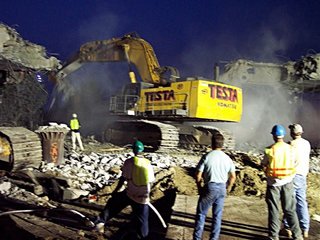

August 17, 2005 Meeting Street (From Sparky Witte)
Here is the current situation with the Meeting Street overpasses


More or less a clash of the titans (surgical titans in this case)


And like our dental colleagues, chipping away at box girders




Frank's view back at Meeting Street, Testa continues to remove the girders
and deposit them on the side (parallel to Meeting St.)

Somehow, I got a big smile from this - Yield to Cashman and Testa while
they do their thing

August 19, 2005: Meeting Street and Jack Foley and Michael Hebb
The Meeting St. overpasses have evaporated

and cleanup is in full swing

One of the more pleasant surprises of our learning experiment (these web
pages) is to actually how the Internet flattens our world and brings folks
together in new ways. In this
case, Jack Foley, one of the large equipment operators, has an aunt, Donna
(who lives in California),
and a sister, Maura (who lives in Massachusetts). Yesterday they sent me
email and wanted to know if I
had met Jack. I did not think so, but it seems I thought that I
encountered him without realizing who he was. Two days ago,
while exploring progress on the Pearman bridge, I met Pio and someone. That
someone turned out not to be Jack, but his friend, Michael Hebb (left).
Donna and Maura asked for me to say "hi" to
Jack - so what to do? Today when I was exploring the progress on Meeting
St. I found Pio and asked if he knew where Jack was. Turns out that Jack
was with him. Here is the photo on the Pearman two days ago (left where
I mixed up Jackie and Michael) and
here they are today (right) at the Meeting St. site.
Our Internet world really is small and brings folks together in surprising
ways. A postscript - Tina Hebb's son actually discovered my mistake in
identify. For the record, Michael wears solid black sun glasses and
Jackie wears mirrored glasses. Isn't the Internet fantastic? So you
check out the sun glasses and figure this puzzle out!


The Meeting St work is almost complete. A fence has been places to separate the
sidewalk from the work area. Here you can see the what is left of the Grace
off ramp. Meeting St. is about ready to reopen

with cleanup in full swing

Here is the Meeting St work site viewed from the Pearman bridge on-ramp.
In another day or so - the area will be restored and will provide new light
for the neighborhood.

and a closer view.
Gone are the overpasses in exchange for new light in the neighborhood.

Compare with 2 days ago (August 17)

Walking back, I am reminded again, of my early Sunday bicycle rides over the
Pearman Bridge. Along the way I stopped and took a series of photos
to track the progress with the Ravenel Bridge. These photos formed the
basis of close-ups and
engineering details photo essays.
Looking east - the roadway is empty with only the signs reminding me
of my earlier adventures on the Pearman Bridge.

and looking east, here is the what remains of the Pearman on-ramp and the Grace
off-ramp.
Here is a typical example
of one of these early morning photos (June 27, 2004).

Continuing walking down the off ramp, you can see the progress in
removing the ramp structures - working their way toward LaSalle and East Bay.

August 19, 2005:
A closer look at the removal process
(from Sparky Witte's photos)
The construction of the Pearman Bridge involved both prestressed concrete
girders as well as steel girders. Here are some learning links to
chase your curiosity about what prestressed concrete is all about. In the
photos below - you can see reinforcing bars (rebar) dangling in all directions -
the result of unbuilding a girder.
The Learning Links


With grapples, the girder and the near support cap are more or less
uprooted.

The rebar at the base of the supporting pier is cut

Working on the next girder, a grapple stabilizes the pier while the
shear cleans the girder along its length



The girder is pushed off the supporting cap

and the shear cuts through the residual rebar

leaving only the supporting pier and cap

and another clash of the titans to uproot the pier and cap

August 26, 2005:
Girder removal process of the Pearman on-ramp:
Cooper and Lee Streets (from Sparky Witte).
The five remaining girders are removed one at a time using
two grapples - the right one stabilizes the girder while the left one
pulls it away from the pier cap

You can see the left side pulled back while the right side begins to drop

and here the two grapples gently lay the girder down

And now there are four - with grapples at each end

The left side pulled back while the right side drops

and sort of put to bed

and now there are three

with the third gently lowered to the ground

Removing the last edge girder - the right grapple stabilizes the girder
while the left grapple disrupts the structural integrity

by pulling the left segment back

and then a controlled drop

Nice job - and all removed

Removing the Piers and Cap
Our Testa surgeon grabs the left side of the pier cap

Pulls it forward a bit

and a little more

releases and a small free fall

August 27, 2005: A summary from East Bay to Meeting Street
Looking up the Grace - US 17 on ramp - almost all removed

From Sparky

The Hanover overpass on Saturday - our surgeons are making great progress
toward the Pearman approach

Pre-op preparations of the Nassau St Overpass - soon to go

On Sunday, the Nassau overpass is mostly girders now (from Sparky)

Looking east - most of the US-17 approach from the Grace off-ramp is gone
and a bit more work remains to get to East Bay

Looking east from Meeting Street - with the Ravenel Bridge in the background

Now that the Meeting Street overpass is gone, our surgeons are working
their way backwards along US 17 toward the East Bay exit.

From Sparky - another view of the Hanover St Overpass (from Sparky)

Exit 221B from I26 - most of the rubble cleared - and you can see the
the skeleton of the Pearman branch off the I26 ramp (on the left)

The new Meeting Street - looking north

August 30 2005: Nassau overpass is down and the Hanover overpass is next
The Nassau St. Overpass is no more.
Three day's ago, this was the Nassau overpass

This is today - and look at the road surface which was protected
by the blankets Cashman/Testa use to protect the surface from falling
debris.

So here is the big picture: The Grace exit ramp, Pearman approach, the new
Ravenel towers in the background and the intersection of Nassau St. with Lee St.

More battle of the Titans - marching toward East Bay

Work in progress: Removing roadway between the girders and making their
way (in reverse) to the Hanover St Overpass.

Water is used to keep the dust down - keeping the neighborhood from experiencing
the Mt. St Helens's volcanic ash effect

and more water


I am quite impressed with what I call the cleaning operation. The shear
operators take a bite of roadway and then sweep it into the intra-beam space
while the water guys keep their water focused on the falling debris

When they finish the intra-beam clean-up, then they start again with the side
barriers: here preparing to take a bite

Taking a bite

and releasing the bite. These really are surgeons - calm, precise and accurate.

Another view (from Nassau St.)
of the backward movement to Hanover (and eventually East Bay)

Here is the next overpass - at Hanover St. Here, I often walked up the
Pearman off-ramp to photograph the progress on
Line 14 (the Morrison St
on-ramp to the Ravenel Bridge).

August 31 2005: Trucking along to the Hanover overpass
The Pearman off-ramp and Hanover overpass

From Nassau - clean road and another segment of the Pearman on-ramp is absent

Looking down the Grace off ramp at the next segment of the Pearman on-ramp to go

Looking up the old Grace reversible on-off ramp - today a pile of rubble.
Tomorrow it will be separated
into concrete for recycling and rebar for recycling

A look at the old and new - Grace, Pearman and in the distance, the Ravenel
towers - then a walk back

The Hanover overpass - Pearman off-ramp interchange

Cleaning up at the Nassau intersection with Lee

September 2 2005: Meeting to East Bay
Meeting Street looks better and better

Nassau is getting cleaner and cleaner

September 11, 2005:
Between Meeting St and East Bay
A lot has happened over the past week. Here is where it all started -
where I-26 diverges from the US-17 Pearman on-ramp. Nothing ....

The edge of the Pearman on-ramp

Here is a view from Meeting Street. Very clean. The stacks of concrete
panels (on the right) are sections removed from the Pearman bridge.

Here is what is left of the Hanover overpass

This is what remains of the Pearman on-ramp and the East Bay off-ramp

And the America St. overpass

Here is the other end of the East Bay off-ramp

September 19, 2005:
Cleaning up between Meeting St and
America St.
From Meeting St to the Grace-Pearman ramps

The America St. Overpass - just a lot of rebar for recyling. Gone
are the Pearman on-ramp and East Bay off-ramp
